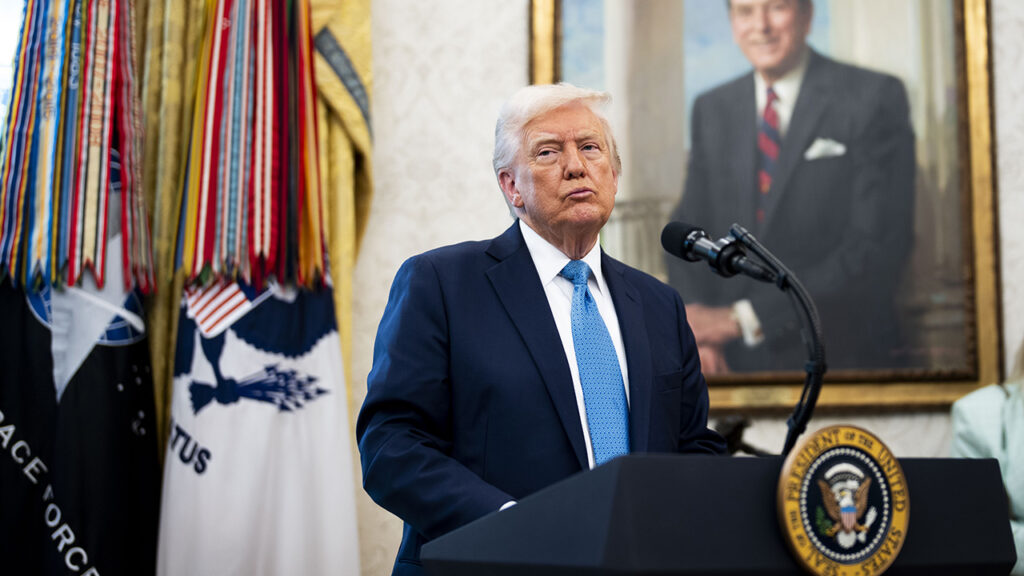In this Sept. 16, 2015, photo, a woman in Sullivan City, Texas, who said she entered the country illegally, walks with her daughter who was born in the United States, but was denied a birth certificate. (AP File)

- A third federal judge blocks Trump’s executive order ending birthright citizenship for children of undocumented immigrants.
- The ACLU files lawsuits, arguing the executive order violates constitutional values; at least nine lawsuits challenge it.
- Judges in Seattle and Maryland also block the order, citing constitutional protections and the rule of law.
Share
|
Getting your Trinity Audio player ready...
|
CONCORD, N.H. — A third federal judge on Monday blocked President Donald Trump’s executive order ending birthright citizenship for the children of people who are in the U.S. illegally.
The ruling from U.S. District Judge Joseph N. Laplante in New Hampshire comes after two similar rulings by judges in Seattle and Maryland last week.
Laplante, who was nominated by Republican President George W. Bush, said he wasn’t persuaded by the Trump administration’s defense of the executive order. He said he would issue a longer preliminary injunction later explaining his reasoning.
A lawsuit filed by the American Civil Liberties Union contends that Trump’s order violates the Constitution and “attempts to upend one of the most fundamental American constitutional values.” It was brought on behalf of immigrant rights groups with members who are pregnant and whose children could be affected by the order.
“For people out there feeling scared or confused right now, I would just say that this is a right that’s enshrined in the Constitution itself as well as in federal statute,” ACLU Immigrants’ Rights Project deputy director Cody Wofsy, who argued the case, said outside the courthouse. “And we and our partners, we’ll keep fighting until this executive order is ended once and for all.”
Lawyers representing the Trump administration declined to comment Monday. But Trump’s Republican administration asserts that children of noncitizens are not “subject to the jurisdiction” of the United States and therefore are not entitled to citizenship. The administration is appealing the Seattle-based judge’s block on Trump’s executive order.
Related Story: 2nd Federal Judge in 2 Days Blocks President Trump’s Birthright ...
9 Lawsuits Have Been Filed
At least nine lawsuits have been filed to challenge the birthright citizenship order.
In the case filed by four states in Seattle, U.S. District Judge John C. Coughenour said last week Trump administration was attempting to ignore the Constitution.
“The rule of law is, according to him, something to navigate around or something ignored, whether that be for political or personal gain,” said Coughenour, who was appointed by Republican President Ronald Reagan. “In this courtroom and under my watch the rule of law is a bright beacon, which I intend to follow.”
A federal judge in Maryland also blocked Trump’s order in another case brought by immigrants’ rights groups and pregnant women whose soon-to-be-born children could be affected.
Trump’s Administration Hasn’t Filed Appeal Yet
The Trump administration has not yet filed an appeal of the preliminary injunction issued by U.S. District Judge Deborah Boardman, who was appointed by Democratic President Joe Biden.
A federal judge in Boston also heard arguments last week in a suit filed by a group of 18 states. U.S. District Judge Leo Sorokin, who was appointed by Democratic President Barack Obama, did not immediately rule.
Laplante, the judge in New Hampshire, praised both sides for the way they made their cases.
“I’m not persuaded by the defendants’ arguments on this motion,” he said. “I have to say: I’m not offended by them, either, as a lawyer or a jurist. I think the rule of law is best served, best maintained and preserved when excellent practitioners present their arguments to the court with all the experience, expertise and knowledge they can muster.”
At the heart of the lawsuits in the three cases is the 14th Amendment to the Constitution, ratified in 1868 after the Civil War and the Dred Scott Supreme Court decision, which held that Scott, an enslaved man, wasn’t a citizen despite having lived in a state where slavery was outlawed.
In 1898, in a case known as United States v. Wong Kim Ark, the U.S. Supreme Court found the only children who did not automatically receive U.S. citizenship upon being born on U.S. soil were children of diplomats, who have allegiance to another government; enemies present in the U.S. during hostile occupation; those born on foreign ships; and those born to members of sovereign Native American tribes.
The U.S. is among about 30 countries where birthright citizenship — the principle of jus soli, or “right of the soil” — is applied. Most are in the Americas and Canada and Mexico are among them.
RELATED TOPICS:
US Brings First Terrorism Charges Against Alleged Venezuelan Gang Member
4 hours ago
Artfully Staged for Takeoff: Fresno Airport Expansion Nears Finish
5 hours ago
Chipotle Tempers Annual Sales Forecast as Dining-out Takes a Hit
5 hours ago
General Motors to Increase Production at Ohio Transmission Facility
5 hours ago
US Justice Department Directs Investigations Over Gender-Affirming Care
5 hours ago
Exclusive: Trump Expected to Sign Order Pushing Training for Skilled Trades
5 hours ago
Kennedy Declares ‘Sugar Is Poison’ While Announcing Ban on Food Dyes
6 hours ago

Five Arrested in Fresno County Robbery Spree. Some Linked to Venezuelan Gang

US Brings First Terrorism Charges Against Alleged Venezuelan Gang Member

Artfully Staged for Takeoff: Fresno Airport Expansion Nears Finish

Chipotle Tempers Annual Sales Forecast as Dining-out Takes a Hit

Wired Wednesday: What’s the Future of Fresno Unified and the Superintendent Position?

Zakaria Draws Parallels Between Trump’s Tariffs, Failed 1930s Economic Policies












